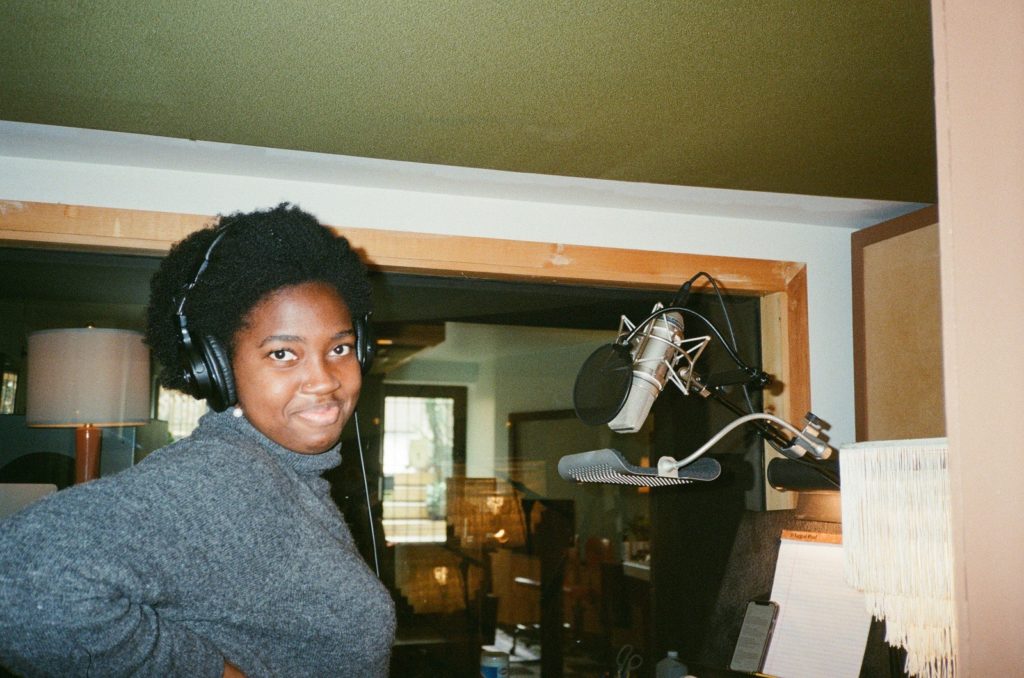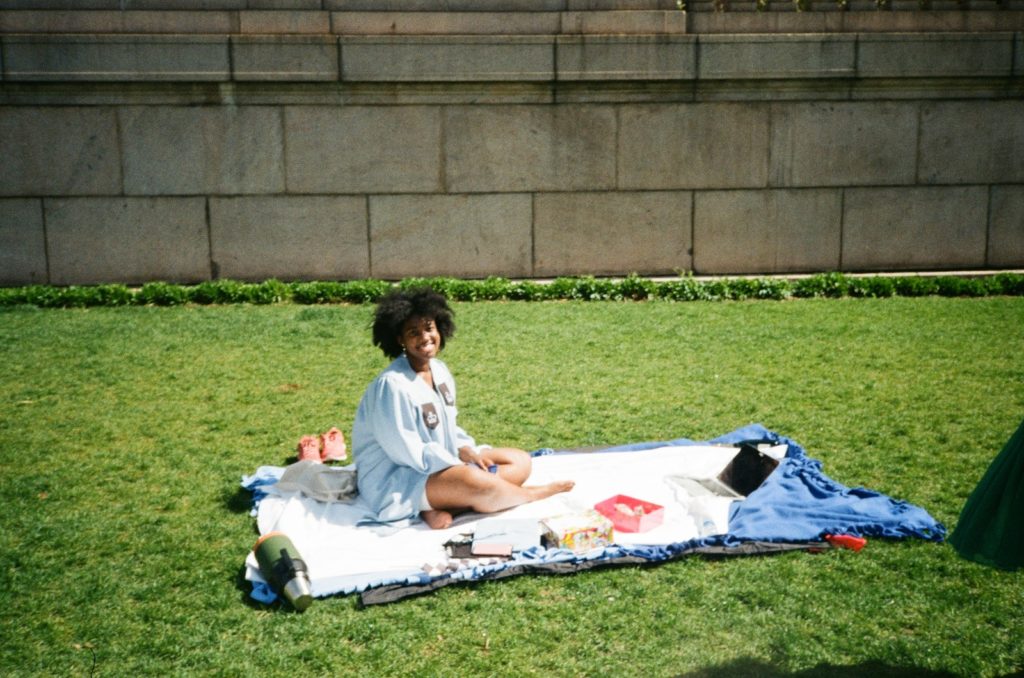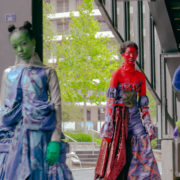Uwade, Indie’s Newest and Brightest Star

Words By: Blossom Maduafokwa
At only 22 years old, Nigerian-American artist Uwade is the newest singer-songwriter captivating the hearts of Grammy-nominated musicians and listeners alike.
In July of 2019, Uwade Akhere posted a cover of “Mykonos” by Grammy-nominated Folk band Fleet Foxes on her Instagram. This action was quite a commonplace one for her, as she routinely posted videos of herself singing the ballads created by her various music heroes. It wasn’t until the next year, studying abroad from New York’s Columbia University at England’s Oxford, that Uwade received a message from Fleet Foxes frontman Robin Pecknold. Like something out of a film, he told her that he was absolutely winded by her talent, and asked if she would be able to come to Paris, where the band would be recording part of their next album.
The ensuing story was a harrowing one: Uwade left her university dormitory to Heathrow Airport but forgot her passport, so she had to return and take a train, which she missed. Even she wonders how she made it to Paris in one piece, or with her head still firmly on her shoulders. Though the journey was a hectic one, it was also one that birthed something beautiful: “Wading in Waist-High Water”, the intro track to Fleet Foxes’ 2020 album Shore. Uwade opens the track and beckons us to the project with calm, tranquil vocals underscored by a soft guitar, allowing the listener to imagine that they, too, might be close to shore.
For anyone else, the story might be read as the simple product of serendipity, or just pure, dumb luck. But this is Uwade. Her talent is the kind that is so raw that it is almost palpable, and her destiny is the sort that is simply written in stone.
Even so, making music as a vocation had not always been a part of Uwade’s plan. Born to two Edo parents in Nigeria but raised in Charlotte, North Carolina, Uwade had grown accustomed to the thought process of what she calls second-generation “progressive” African parenting.
“Because of my parents,” she tells me from her home in North Carolina, “I’ve always had the view presented to me that you do something ‘serious’ as your priority, and then you do music in the background, on the side…I even adopted that view.” Indeed, after Uwade told her father in 2019 that she wanted to be a musician he, in her words, simply laughed, half-jokingly saying, “No daughter of mine is going to be a musician.” She is near to laughter herself as she recounts the story to me.
This is not to say that music was not something that informed her life, however. From her youth she picked up singing from her father; it was something the two routinely did together that quickly became their shared ritual. What’s more, hers was a household firmly steeped in the sounds of Nigeria at large and Edoland in particular, and as such she was raised listening to the likes of Fela Kuti and Sir Victor Uwaifo.
Uwade additionally collected influences of her own, falling deeply in love with everything from the Rock stylings of Strokes frontman Julian Casablancas to the soulful yearning of Frank Ocean. By the age of eight, she had already begun playing piano, by fourteen she could hold her own on the guitar, and by the age of eighteen she had already joined her Alma Mater’s most prestigious acapella group. In short: music was part of the air that Uwade breathed. She just didn’t know that it was to be a central part of her destiny, too.
It wasn’t until early 2019, in the second year of her tenure at Columbia University, that Uwade picked up a pen and began writing lyrics of her own, changing her trajectory forever. In her mind, though, her life was still to go on as planned. “I started writing, and even then I was like, you know, I’ll keep doing school, and then go to Grad school. I wanted to be a professor.”
This period of her life birthed her debut single “Nostalgia”. After her second year, she was to begin her year studying abroad at Oxford University, an upcoming shift in her life that bred a lot of apprehension.
“I wrote it [“Nostalgia”] about study abroad,” she tells me. “Now, looking back, it seems like a very minor, side event in my life. At the time, after Sophomore year, when I was just starting to make friends, the thought of leaving for a year was just terrifying.”
The track is a beautiful, stripped down acoustic ballad, enveloped by Uwade’s gentle alto and lyricism about loss and life’s sudden changes. Its relatability to listeners as well as its beautiful composition have earned the song over a million streams on Spotify, as well as giving Uwade a name in the world of music. It is rare for someone’s debut track to be the very song that makes them, but again, this is Uwade. Something that had started as a “background” passion was now insistently pushing itself to the fore.

“Nostalgia” was only the beginning for her, and only a year after came her famed Fleet Foxes feature. It was that same year, however, that tragedy struck: Uwade’s father – Dr. James I. Akhere – tragically passed away in August of 2020. To commemorate his life and death, she has recently released two more songs – “Lodarore” and “The Man Who Sees Tomorrow” – in a single EP dedicated to him.
The former track is a folk reworking of the timeless “Lodarore” by Sir Victor Uwaifo, the legendary Edo guitarist responsible for classics such as “Joromi” and “Guitar Boy”. Uwade’s version of the song was born out of being lost in memories of her father, her very own ritual to ensure that no part of him was ever lost to her.
“I didn’t even know it was a Victor Uwaifo song,” Uwade begins. “My dad and I just sang it all the time when I was little. Singing was our thing together. And so, he would sing that song, and after he passed, I was just cataloguing memories because I didn’t want to forget anything, and I wrote that down, and then for some reason I was like, ‘Why don’t I look it up on Google?’…I was already a fan of Victor Uwaifo and loved Victor Uwaifo. I could not believe that this song I’d been singing for the past decade existed.”
“Lodarore” gained an overwhelming response because, in Uwade’s words, “Benin and Edo music isn’t super well represented.” More than putting her tribe and country’s musical legacy on the map, she was able to honor her father and the many memories she had with him. The EP’s other track “The Man Who Sees Tomorrow” goes even further, delving into the intricacies of Uwade’s grief, her father’s life, and his afterlife.
“My dad was a very loquacious person, a very eloquent man,” Uwade recalls fondly, her lips lifting into the smallest of smiles. “He said a lot of very funny things, and he called himself ‘The Man Who Sees Tomorrow’ in a text to me. He was talking about my name, and he was like, ‘I can surely lay claim to the description of ‘The Man Who Sees Tomorrow’ because 20 years ago I gave you a prophetic name that will continue to manifest itself.’ I thought that was so funny and I thought that it was also beautiful. Then it all just came together. I was gonna call the song ‘The Man Who Sees Tomorrow,’ it was gonna be both about my personal grief, [and] about my dad.”
Released on her father’s birthday in April of this year, the EP has already gained widespread acclaim. Clearly, Uwade’s short period in the world of music has been a loaded one, and she doesn’t plan on slowing down anytime soon. Next Spring she is slated to go on a US tour as an opening act with none other than Swedish folk artist The Tallest Man on Earth, as well as performing in North Carolina this August alongside the likes of Sylvan Esso.
In terms of her individual trajectory, Uwade is focused on defining her music past the “Folk” label that has thus far been assigned to it.
“Some of my [unreleased] songs are very referential to Motown…I have songs that are referential to 60s Beatles-type Pop, I have songs that are classic R&B, I have songs that are more Folk and Indie,” she says to me. “So I have struggled to create a cohesive image for myself that can be presented. And I know that doesn’t always have to happen, but, I guess in these early stages, the songs that I’ve put out people have categorized as Folk. In my mind, I’m like, ‘y’all do what you need to do, because I don’t know if I’m gonna stay in this lane forever.’”
Her dream collaborations speak to the expansiveness of the music she wants to make, as she cites Solange, Devonte Hynes, Vampire Weekend, Lianne La Havas, and Clairo, to name a small few. Uwade is undoubtedly a girl of innumerable influences, all of which she holds extremely close to her heart.
Ever the Taurus, Uwade is also a girl who always has a plan. She is already set to return to Oxford University this fall as a postgraduate student, where she intends to study Classics. She has a very clear picture of where she wants to be in the future, and her mentality towards her music is no different. When I ask her where she sees herself within a year, she gives me a firm, thorough answer.
“Well, I will have completed my first tour,” Uwade begins. “I’m hoping I’ll have something out by then…but I think I will be more self-defined than I am now. And not in a restrictive way, but in the sense that a lot of the songs that I’ve been working on and that I want to release have a personality to them that is more developed than just guitar and voice…I’ll have a sense of ‘Uwade’ that is more expansive than it is now. And I think I will have met a lot of incredible artists and learnt a lot from them. Hopefully, I’ll be planning my own headlining tour.”
For many, these might be hopeful aspirations, but of course, this is Uwade. She is a force in her craft, with a musical range and future as expansive as the sky. There is no limit to the art she will create, in the exact same way that there is no limit to her destiny.





![ZINO VINCI’S ‘FILTHY & DISGUSTING’EP BRINGS YOU TO THE CORE OF THE ARTIST [@ZinoVinci]](https://guap.co/wp-content/uploads/2023/10/Zino-4.jpg)




